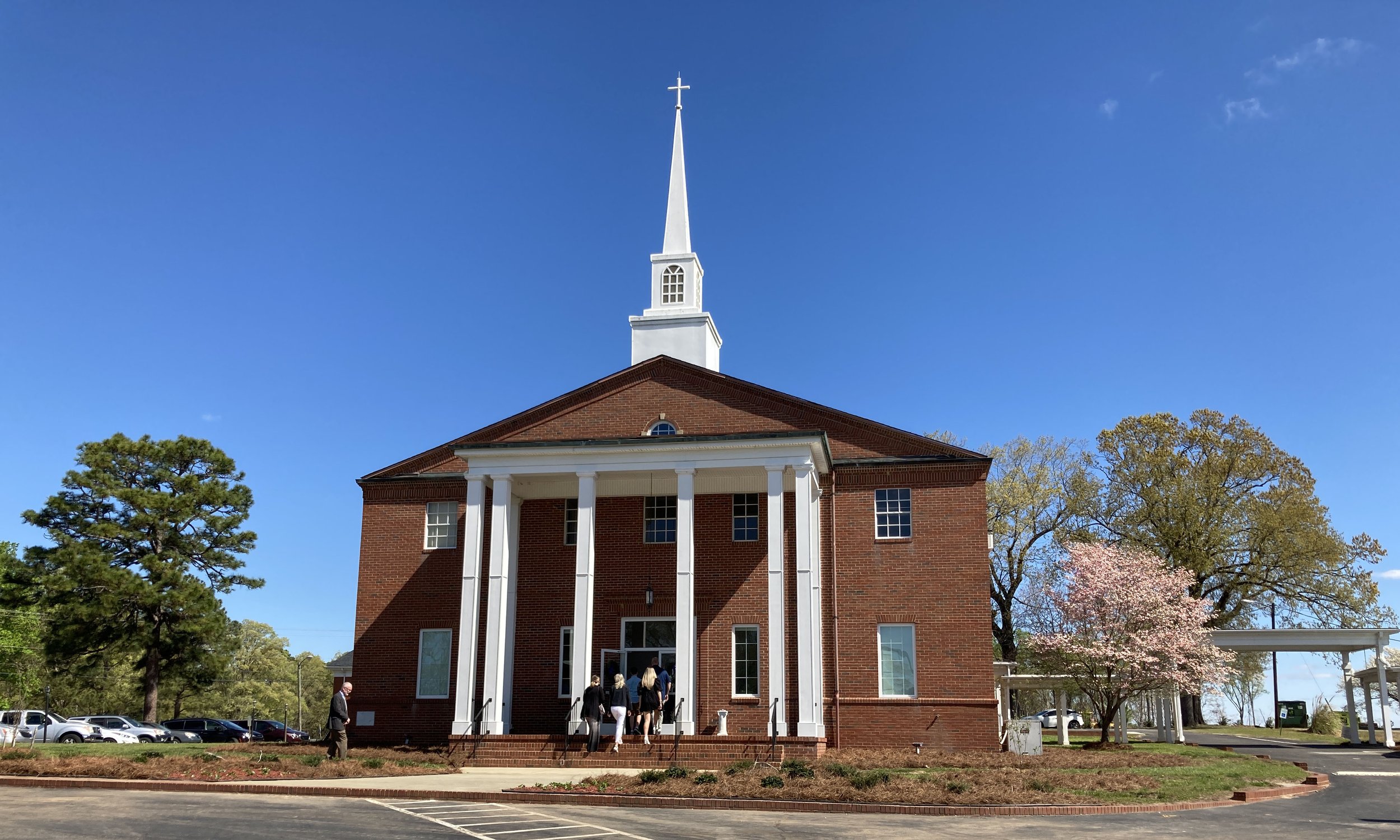PLEASANT GROVE BAPTIST CHURCH
Our Mission – making disciples while being discipled in Christ.
Our Vision – we desire to see people far away from God find love and life in
Jesus and follow Him forever.
Our Values – we love the person, character, work, and reputation of Jesus. We love people with joy.
Our Strategy – Jesus calls His disciples to:
A life committed to LOVING God (worship)
A life committed to GROWING and learning to become like Him
(discipleship, prayer)
A life committed to SERVING the needs of others (missions, fellowship)
A life committed to SHARING the Gospel about Him (evangelism)
We live best when we love Jesus most
We grow best when we grow together in Jesus
We look most like Jesus when we are serving
We love most like Jesus when we are sharing the Good News of Jesus.
Our Purpose – to change the world.
Our Ambition – to be an extraordinary church.
Our Motive – we are committed to live, doing all we do for God’s glory – to show and share His beauty, majesty and worth as we have seen it and experience it in the face of His great Son, Jesus.
Acts 1:8; Matthew 25:40; 2 Corinthians 4:6
~~~~~~~~~~~~~~~~~~~~~~
Why would we adhere to these statements?
Concerning Evangelism & Missions
It is the duty and privilege of every follower of Christ and of every church of the Lord Jesus Christ to endeavor to make disciples of all nations. The new birth of man's spirit by God's Holy Spirit means the birth of love for others. Missionary effort on the part of all rests thus upon a spiritual necessity of the regenerate life, and is expressly and repeatedly commanded in the teachings of Christ. The Lord Jesus Christ has commanded the preaching of the gospel to all nations. It is the duty of every child of God to seek constantly to win the lost to Christ by verbal witness undergirded by a Christian lifestyle, and by other methods in harmony with the gospel of Christ.
Genesis 12:1-3; Exodus 19:5-6; Isaiah 6:1-8; Matthew 9:37-38; 10:5-15; 13:18-30, 37-43; 16:19; 22:9-10; 24:14; 28:18-20;
Luke 10:1-18; 24:46-53; John 14:11-12; 15:7-8,16; 17:15; 20:21; Acts 1:8; 2; 8:26-40; 10:42-48; 13:2-3; Romans 10:13-15;
Ephesians 3:1-11; 1 Thessalonians 1:8; 2 Timothy 4:5; Hebrews 2:1-3; 11:39-12:2; 1 Peter 2:4-10; Revelation 22:17.
Concerning Discipleship
Christianity is the faith of enlightenment and intelligence. In Jesus Christ abide all the treasures of wisdom and knowledge. All sound learning is, therefore, a part of our Christian heritage. The new birth opens all human faculties and creates a thirst for knowledge. Moreover, the cause of education in the Kingdom of Christ is co-ordinate with the causes of missions and general benevolence, and should receive along with these the liberal support of the churches. An adequate system of Christian education is necessary to a complete spiritual program for Christ's people. In Christian education there should be a proper balance between academic freedom and academic responsibility. Freedom in any orderly relationship of human life is always limited and never absolute. The freedom of a teacher in a Christian school, college, or seminary is limited by the pre-eminence of Jesus Christ, by the authoritative nature of the Scriptures, and by the distinct purpose for which the school exists.
Deuteronomy 4:1,5,9,14; 6:1-10; 31:12-13; Nehemiah 8:1-8; Job 28:28; Psalms 19:7ff.; 119:11; Proverbs 3:13ff.; 4:1-10; 8:1-7,11;
15:14; Ecclesiastes 7:19; Matthew 5:2; 7:24ff.; 28:19-20; Luke 2:40; 1 Corinthians 1:18-31; Ephesians 4:11-16; Philippians 4:8;
Colossians 2:3,8-9; 1 Timothy 1:3-7; 2 Timothy 2:15; 3:14-17; Hebrews 5:12-6:3; James 1:5; 3:17.
art by Marion Terry
Concerning Prayer
God is calling us as followers of Christ to glorify Him through a holy lifestyle of passionate, Spirit-led prayer that seeks His kingdom purposes. Jesus, quoting from Isaiah said, It is written that my house will be called a house of prayer for all peoples. The three focuses of a local church prayer ministry are: intercessory prayer for our pastors and church staff; intercessory prayer for others, and intercessory prayer for the spiritually lost. Prayer offers believers a means of acknowledging the character and purposes of God and the opportunity to seek guidance concerning his will for them.
Palms 123:1-2; Palms 25:1; 86:4; 121:1-2; 143:8-; 145:15; Palms 73:23-26; Exodus 33:11; 1 Kings 8:57-59;
Palms 16:2; 145:17-20; Matthew 18:20; Luke 5:16; Nehemiah 2:4; Daniel 6:10-11,13; Palms 27:4; 1 Chronicles 16:10-11 pp; Palms 105:3-4; Palms 27:8; Isaiah 55:6; Jeremiah 29:13; Acts 17:27-28; Hebrews 11:6; 1 Samuel 3:10; Isaiah 6:8; Revelation 3:20; 1 John 1:5-9; Isaiah 6:3-7; 55:7-9; Palms 51:1-2; John 15:7-8; Palms 119:105-106;
Luke 1:38; John 15:16; Hebrews 4:16; Nehemiah 1:4-7; Palms 123:1-2; James 1:5-8; John 17; Matthew 6:5-13, 1 Samuel 12:23; Romans 12:12; Colissians 4:2: 1 Thessalonians 5:17; 1 Timothy 2:8; Matthew 21:22; Mark 9:29; Acts 12:5-7; James 1:5, 5:17-18; Luke 11:9-10; Philippians 4:5-7; Hebrews 5:7.
Concerning Worship
True worship is not the mechanical repetition of rituals, but should be wholehearted and reverent. It should be based upon trustful and obedient lives, in that obedience is itself to be seen as an act of worship. Worship is not confined to a place or time, but is enjoyed when the believer seeks to express heartfelt gratitude to God for sustainable grace, mercy, and forgiveness. Praise and thankfulness are important elements of worship, which also includes confession of sin, the reading of Scripture and music. Scripture stresses the importance of regular worship, while at the same time recognizing that believers may worship God spontaneously.
Genesis 22:2; 12:1,7-8; Deuteronomy 30:16-20; 1 Samuel 15:22; Palms 40:6-8; Jeremiah 7:2; Daniel 3:28; Acts 13:2; Romans 12:1;
John 4:23-24; Hebrews 10:1; 1 Chronicles 16:29; Palms 96:8-9; Isaiah 29:13; Leviticus 10:1; Matthew 15:7-9; Mark 7:6-7;
Philippians 3:3; Colossians 2:23; 1 Corinthians 14:40; 1 Chronicles 16:37-42; 1 Kings 18:30-39; 1 Colossians 14:26; Micah 6:6-8; Romans 12:1; Palms 15:1-5; 24:3-4; 1Timothy 2:10; 1 Corinthians11:28; Leviticus 16:3-4; 2 Samuel 12:20; 2 Chronicles 7:1;
Matthew 2:11; Deuteronomy 6:5; Exodus 34:14; Deuteronomy 10:12; Joshua 22:5; 1 Samuel 12:24; Palms 27:4; Matthew 22:37;
Mark 12:30; Luke 10:27; Hebrews 10:22-23; Genesis 4:4; James 4:8; Hebrews 7:19; 11:4
Concerning Fellowship
We are commanded by God to be in unity. Our English word, “fellowship” is the translation of the Greek word, “koinonia.” This Greek word is derived from the root, “koinos,” which was a prefix in ancient Greek. If you were to add this prefix to words meaning “living,” “owning a purse,” “a dispute,” and “mother,” you would get words meaning “living in community together,” “owning a purse in common,” “a public dispute,” and “having a mother in common.” So we see that the root of the word, “fellowship,” means “to hold something in common.” Fellowship is God’s way of accomplishing His plan of glorifying Christ. It can be seen that fellowship occurred naturally as a result of the establishment of the church, and it is the indispensable means of accomplishing the God-given purpose of the church. In our attempt at modeling fellowship, we strive to be in harmony and unity through mission trips, Bible study, worship, and social gatherings.
Acts 2:42-47; Ephesians. 3:8-11; 1 Corinthians 12; 1 John 1:3-7; Psalm 55:14; Psalm 133:1; Hebrews 10:24-25
How We Receive Church Membership
The members of this fellowship invite you to commit your life to Jesus Christ and join us in His service.
New Christians are received upon their profession of faith in Jesus Christ and acknowledgment of His Lordship through believer’s baptism by immersion.
Members of Baptist churches are received by transfer of their membership.
Other Christians are received upon satisfactory statement of their prior conversion after a consultation with the pastor on their commitment to Jesus as Savior and Lord and a commitment to this church.
If you wish to unite with us in this ministry, you may come forward at the end of a service and a minister will greet you and receive your request.



